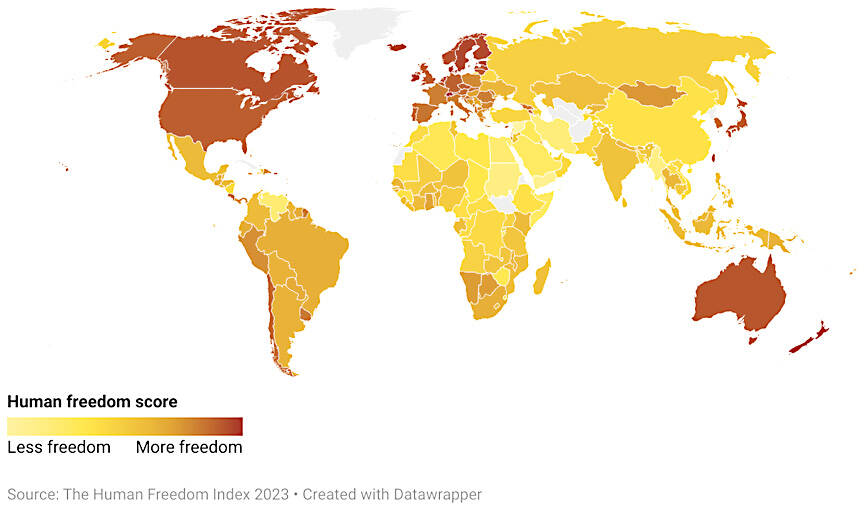Taiwan ranked 12th among 165 jurisdictions around the world and first in Asia in this year’s Human Freedom Index with a score of 8.56, retaining its position from the previous year.
The index, compiled by the Washington-based Cato Institute and the Vancouver-based Frasier Institute, ranked 165 jurisdictions for “personal,” “economic” and “human” freedom in 2021, the most recent year for which sufficient data were available, the report said.
Taiwan scored 7.97 for economic freedom, or ranking 11th in the world — up from 24th in 2020 — and 8.98 for personal freedom, 12th and unchanged from 2020.

Photo: Screen grab from the Cato Institute’s Web site
The report defines freedom as the absence of coercive constraints.
The criteria for economic freedom include size of government, legal system and property rights, sound money — focused mainly on inflation — freedom to trade internationally and regulation.
Personal freedom criteria cover the rule of law, security and safety, movement, religion, expression and information, relationships, and association, assembly and civil society.
Human freedom “deteriorated severely in the wake of the coronavirus [COVID-19] pandemic,” the report said, pointing to “significant declines in the rule of law, freedom of movement, expression, association and assembly, and freedom to trade.”
Taiwan’s scores also declined after consistent rises from 8.31 (28th) in the first year of the index in 2000 to peaks of 8.81 in 2016, when it was 17th in the world, and 2019 (14th).
In 2020 and 2021, Taiwan’s score fell to 8.56, with its economic freedom score dipping below 8 for the first time since the middle of the 2010s and personal freedom dropping below 9 for the first time since the early 2000s.
However, only two main factors showed substantial declines in those two years in the index — freedom of movement, likely due to travel restrictions related to the pandemic, and media and expression as defined by Varieties of Democracy, a Swedish research institute.
In other categories, the scores for Taiwan were largely unchanged.
Switzerland was No. 1 for the fourth year in a row, followed by New Zealand, Denmark, Ireland, Estonia and Sweden (tied for fifth), Iceland, Luxembourg, Finland and Norway.
Japan was the second-highest in Asia at 16th, followed by South Korea (28th), Armenia (33rd) and Singapore (44th).
China was 149th and the lowest-ranked jurisdiction was Syria.

DAREDEVIL: Honnold said it had always been a dream of his to climb Taipei 101, while a Netflix producer said the skyscraper was ‘a real icon of this country’ US climber Alex Honnold yesterday took on Taiwan’s tallest building, becoming the first person to scale Taipei 101 without a rope, harness or safety net. Hundreds of spectators gathered at the base of the 101-story skyscraper to watch Honnold, 40, embark on his daredevil feat, which was also broadcast live on Netflix. Dressed in a red T-shirt and yellow custom-made climbing shoes, Honnold swiftly moved up the southeast face of the glass and steel building. At one point, he stepped onto a platform midway up to wave down at fans and onlookers who were taking photos. People watching from inside

A Vietnamese migrant worker yesterday won NT$12 million (US$379,627) on a Lunar New Year scratch card in Kaohsiung as part of Taiwan Lottery Co’s (台灣彩券) “NT$12 Million Grand Fortune” (1200萬大吉利) game. The man was the first top-prize winner of the new game launched on Jan. 6 to mark the Lunar New Year. Three Vietnamese migrant workers visited a Taiwan Lottery shop on Xinyue Street in Kaohsiung’s Gangshan District (崗山), a store representative said. The player bought multiple tickets and, after winning nothing, held the final lottery ticket in one hand and rubbed the store’s statue of the Maitreya Buddha’s belly with the other,

‘COMMITTED TO DETERRENCE’: Washington would stand by its allies, but it can only help as much as countries help themselves, Raymond Greene said The US is committed to deterrence in the first island chain, but it should not bear the burden alone, as “freedom is not free,” American Institute in Taiwan Director Raymond Greene said in a speech at the Institute for National Defense and Security Research’s “Strengthening Resilience: Defense as the Engine of Development” seminar in Taipei yesterday. In the speech, titled “Investing Together and a Secure and Prosperous Future,” Greene highlighted the contributions of US President Donald Trump’s administration to Taiwan’s defense efforts, including the establishment of supply chains for drones and autonomous systems, offers of security assistance and the expansion of

STREAMLINED: The dedicated funding would allow the US to transfer equipment to Taiwan when needed and order upgraded replacements for stockpiles, a source said The US House of Representatives on Thursday passed a defense appropriations bill totaling US$838.7 billion, of which US$1 billion is to be allocated to reinforcing security cooperation with Taiwan and US$150 million to replace defense articles provided to the nation. These are part of the Consolidated Appropriation Act, which the US House yesterday passed with 341 votes in favor and 88 against. The act must be passed by the US Senate before Friday next week to avoid another government shutdown. The US House Committee on Appropriations on Monday unveiled the act, saying that it allocates US$1 billion for the Taiwan Security Cooperation Initiative